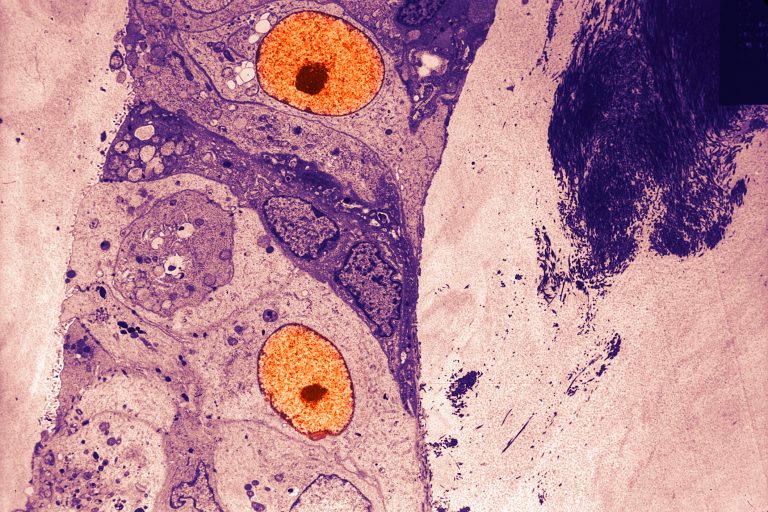
An experimental form of immunotherapy that uses an individual’s own tumor-infiltrating lymphocytes (TILs) seems promising against metastatic breast cancer, according to results from an ongoing clinical trial led by researchers at the National Cancer Institute (NCI). This is a step forward for using adoptive cell therapy in solid tumors, one of the big challenges in oncology today.
“We’re using a patient’s own lymphocytes as a drug to treat the cancer by targeting the unique mutations in that cancer,” said study leader Steven A. Rosenberg, chief of the Surgery Branch in NCI’s Center for Cancer Research. “This is a highly personalized treatment.”
The study reinforces that people with metastatic breast cancer can mount an immune reaction against their tumors, which is a prerequisite for this type of immunotherapy. The TILS specifically target neoantigens, and the response is very patient specific.
The trial included 42 women with metastatic breast cancer, 28 (or 67%) generated an immune reaction against their cancer. Six women were then treated with TILs, half of whom experienced measurable tumor shrinkage. Results from the trial appeared Feb. 1, 2022, in the Journal of Clinical Oncology.
The twenty-eight women who generated an immune response had TILs that recognized at least one neoantigen. But nearly all the neoantigens identified were unique to each patient.
Solid tumors appear resistant to CAR-T therapy, which has so far been useful in blood cancers and melanomas. Notably, skin cancers have many more mutations (400-500 versus 100) than most other tumors. Breast cancer is one of the most common solid tumors.
“It’s popular dogma that hormone receptor–positive breast cancers are not capable of provoking an immune response and are not susceptible to immunotherapy,” said Rosenberg. “The [current] findings suggest that this form of immunotherapy can be used to treat some people with metastatic breast cancer who have exhausted all other treatment options.”
The immunotherapy approach used in the current trial was pioneered in the late 1980s by Rosenberg and his colleagues at NCI. “We started out with TILs against melanoma in 1988,” Rosenberg told Inside Precision Oncology (IPO). “We published a final analysis of our first trial results in 2011.”
That study included just over 90 patients. To date, Rosenberg said “More than 200 patients have been treated with TILs, including some with skin, liver, colon, cervical, and breast cancer.”
TILs are T Cells found in and around the tumor. The key to TIL therapy, Rosenberg told IPO “Is that you must select for TILs that have reactivity.” Neoantigens, which are produced when mutations occur in tumor DNA, appear to be the key to finding these lymphocytes. “It’s fascinating that the Achilles’ heel of these cancers can potentially be the very gene mutations that caused the cancer,” he added.
The results of this new study come from an ongoing phase 2 clinical trial being carried out by Rosenberg and his colleagues. This trial was designed to see if the immunotherapy approach could lead to tumor regressions in people with metastatic epithelial cancers, including breast cancer. In 2018, the researchers showed that one woman with metastatic breast cancer who received this treatment had complete tumor shrinkage.
In the current trial, the researchers used whole-genome sequencing to identify mutations in tumor samples from 42 women with metastatic breast cancer whose cancers had progressed despite all other treatments. The researchers then isolated TILs from the tumor samples and, in lab tests, tested their reactivity against neoantigens produced by the different mutations in the tumor.
As noted, twenty-eight women had TILs that recognized at least one neoantigen, nearly all of which were unique to each patient.
For the six women treated, the researchers took the reactive TILs and grew them to large numbers in the lab. They then returned the immune cells to each patient via intravenous infusion. All the patients were also given four doses of the immune checkpoint inhibitor pembrolizumab (Keytruda) before the infusion to prevent the newly introduced T cells from becoming inactivated.
After the treatment, tumors shrank in three of the six women. One is the original woman reported in the 2018 study, who remains cancer free to this day. The other two women had tumor shrinkage of 52% and 69% after six months and 10 months, respectively. However, some disease returned and was surgically removed. Those women now have no evidence of cancer approximately five years and 3.5 years, respectively, after their TIL treatment.













